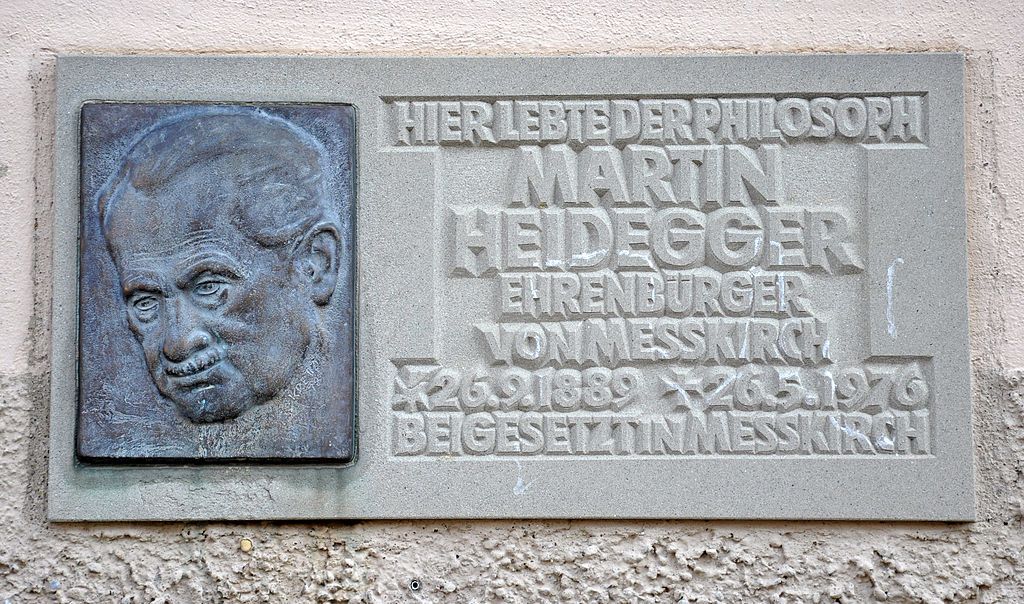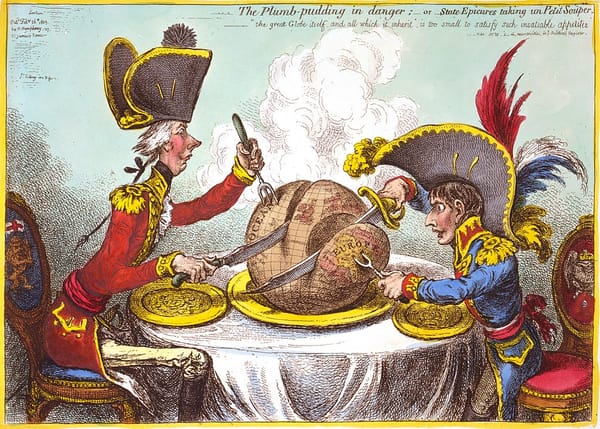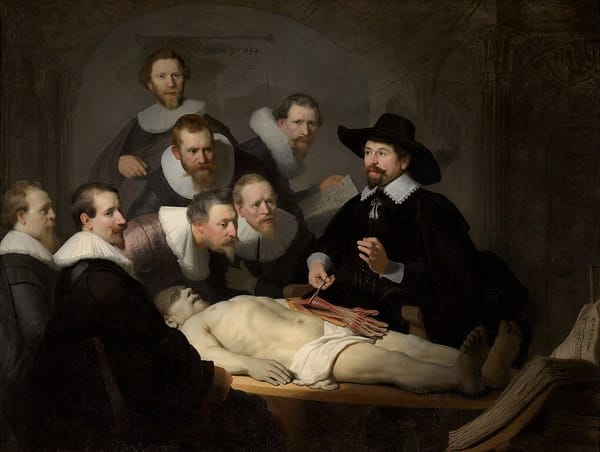Heidegger's Critique of Liberalism

Europe, in its unholy blindness always on the point of cutting its own throat, lies today in the pincers between Russia on one side and America on the other. Russia and America, seen metaphysically are both the same: the same hopeless frenzy of unchained technology and the rootless organization of the average man. When the farthest corner of the globe has been conquered technologically and can be exploited economically…when a boxer counts as a great man of a people; when the tallies of millions at mass meetings are a triumph; then, yes then, there still looms like a spector over all this uproar the question: what for?-where to?-and what then? The spiritual decline of the earth has progressed so far that peoples are in danger of losing their last spiritual strength, the strength that makes it possible even to see the decline.
Martin Heidegger, Introduction to Metaphysics
Martin Heidegger is one of the most important thinkers of the 20th century and was a member and defender of the Nazi party. The jarring divide between these two facts has made many people uncomfortable. Historically the common mode of apology was to cordon off Heidegger’s thinking from his politics, insist they have little if anything to do with one another, and remind everyone that being a bad man has never been a barrier to writing good books. Heidegger himself cannily leaned into these exonerations, describing himself to friends and admirers as politically naïve—the charming philosopher king who, like Plato, lacked common sense in his everyday dealings.
On one of the few occasions where he discussed his Nazi past, a 1966 interview with Der Spiegel published after his death, Heidegger downplayed his commitments and even claimed that anyone who attended his 1936 lectures on Nietzsche would recognize that they constituted “a confrontation with National Socialism.” Nevertheless, Heidegger refused to apologize and even doubled down on many of his anti-democratic and illiberal sentiments. He observed that “the planetary movement of modern technology is a power whose great role in determining history can hardly be overestimated. A decisive question for me today is how a political system can be assigned to today’s technological age at all, and which political system would that be? I have no answer to this question. I am not convinced that it is democracy.” Without a doubt Heidegger was confident that the long sweep of history would prove he was right about the big picture as the living testaments to his great errors faded.
This position has become harder and harder to defend. Firstly because the publication of many of Heidegger’s posthumous works testify to both the depth and virulence of his Nazism, and especially his antisemitism. Especially notorious are Heidegger’s “Black Books,” which include gems like “even the thought of an agreement with England, in the sense of a division of imperialist ‘jurisdictions,’ does not reach the essence of the historical process that England is now playing out to its end within Americanism and Bolshevism, and this at the same time means within world Jewry. The question of the role of world Jewry is not a racial question, but the metaphysical question about the kind of humanity that, without any restraints, can take over the uprooting of all beings from Being as its world-historical ‘task.”
Secondly, recent academic works by serious scholars like Emmanuel Faye and Ronald Beiner have done a lot to showcase the depth of Heidegger’s political commitments in practice and demonstrate how much of this flows from his more technical philosophy. And third and most importantly, Heidegger’s writings have enjoyed a surging popularity in today’s far right and neofascist circles. In particular Russia’s post-modern fascist Alexander Dugin has written hagiographic books on Heideggerian politics which have had a cultish influence. As Alexander Reid Ross put it in Against the Fascist Creep, the far right lumps him in the “panoply of ‘great thinkers’ in the fascist pantheon-Heidegger, Evola, Nietzsche, Junger, and Schmitt…”
Heidegger on an authentic politics
Part of the difficulty in understanding his politics is that, unlike Nietzsche or Schmitt, Heidegger is rarely straightforward in presenting his views. There is rarely anything as purple as Nietzschean invective against the “lie of equality of souls.” Heidegger’s writing tends to operate in three rhetorical modes: reactionary pastoralism, technical academese, and grandiose bombast. None have the literary charms of Nietzsche’s writing. But let there be no doubt that Heidegger shares all the conventionally anti-egalitarian convictions of the far right. In one of the rare moments of political candor in Introduction to Metaphysics Heidegger rails against liberal and socialist metaphysics—“metaphysically the same”—because they “aggressively destroys all rank and all that is world-spiritual, and portrays these as a lie.” He gloomily observes that the “darkening of the world is happening. The essential happenings in this darkening are: the flight of the gods, the destruction of the earth, the reduction of human beings to a mass, [and] the pre-eminence of the mediocre.”
In Being and Time Heidegger takes aim at the philosophy of the subject which lies at the epicenter of liberal thinking from Descartes through Kant. He criticizes figures like Kant for assuming the basis of human experience is “reason,” and consequently putting the rational subject at the heart of social life. Instead Heidegger argues that our “structural primordiality” is in fact “care.” Before we reason about the world we are embedded within and care about it, which shapes everything from our perception to our experience of time. Heidegger criticizes Kant for assuming that human beings experience time in a linear fashion, proceeding from moment to moment. This has the moral consequence of inspiring us to think exclusively about the present, which obtains a reality denied to past and future. But in fact Heidegger insists human beings experience time “ecstatically” as a continuous fusion of past, present, and future. Think about a hockey player passing a puck. Yes she needs to apprehend the puck in front of her in the present moment. But she also draws deeply on her experiences and training past while projecting the puck into the future as she anticipates who to pass it to and how that will help the team win the game.
This is in fact a profound contribution to the philosophy of the subject, and one doesn’t have to agree with Heidegger’s politics to profit from it. One of the great works of 20th century philosophy, Herbert Dreyfus’ classic What Computers Still Can’t Do, drew on Heidegger to critique AI theorists who assumed that consciousness was just a matter of being rational rather than embeddedness and care. The problem comes from how Heidegger interprets these phenomenological themes in terms of the inauthenticity of modern society. He argues that human beings (Dasein) experience tremendous angst or anxiety about the future, which makes us aware of our finitude by exposing us to the inevitability of death. As Macbeth once put it, the reality sinks in that death isn’t the shadow of life. Life is the shadow of death, and it will endure forever.
For Heidegger, deeply impressed by modern liberal materialism and urbanism, most of us will choose to hide from the reality of our death in the world of the “they.” We become enamored of the “endless multiplicity of closest possibilities offering themselves—those of comfort, shirking, and taking things easy.” Paradoxically, in the pursuit of our individual comforts, we in fact become more and more indistinguishable from everyone else; caught up in the idle chatter of democratic mediocrity which imposes a levelling pressure.
In Being and Time Heidegger holds out the possibility that, for some, confronting the reality of death might stir them to live more authentically by committing to great projects which would be elevating and distinct. Regarded in hindsight, successfully pulling off these projects can give them the impression and allure of a “destiny.” One might see in this Heideggerian emphasis on authenticity the seeds of a kind of romantic individualism or even a left wing critique of consumer society. But in fact Heidegger rejects these prospects, holding to the more volkish perspective that a “destiny” always belongs to a sufficiently worthy people. In this case the spiritually attuned Germans, whose metaphysical sensitivity elevates them far above the vulgarities of Russia and America.
With this term [destiny], we designate the occurrence of the community of a people. Destiny is not composed of individual fates, nor can being-with-one another be conceived of as the mutual occurrence of several subjects. These fates are already guided beforehand in being-with-one-another in the same world and in the resoluteness for definite possibilities. In communication and in the struggle the power of destiny first becomes free.
When Hitler came to power Heidegger was enthusiastic, seeing in the Fuhrer the prospect of palingenetic ultranationalist renewal by committing the people to a destiny higher than the vulgar bohemian liberalism and socialism offered by the Weimar Republic. Upon assuming the Rectorship of the University of Freiburg and joining the Nazi Party Heidegger gave an infamous address which encouraged the students to submit to Hitler enthusiastically. He promised them they had a special role to play in the new order as the future “leaders and guardians of the destiny of the German people.” Their struggles on behalf of the new order would help bring about a new Germany whose job would be to save Western civilization from the decadent nihilism embodied in its geopolitical rivals. While Heidegger rarely succumbed to glorification of violence seen in other fascist thinkers, as Emmanuel Faye points out he nevertheless greeted the early triumph of Nazi arms as a confirmation of his theories. By contrast when the Second World War ended with Hitler foaming that his own people had failed, Heidegger’s response was to shrug and insist that it had proven nothing at a metaphysical level. As Ronald Beiner put it in Dangerous Minds:
On Heidegger’s view one needs to think in centuries. He assumed that people would be reading him for centuries (just as one continues to read Aristotle or Hegel). The twentieth century was a lost cause…But eventually people would forget Mussolini and Hitler and remember Heidegger. Three hundred years from now, people would see that philosophically, Heidegger was right, even if he made some tactical mistakes in the 30s. (Over the span of centuries, who would care what happened in the 1930s?) Gadamer once said (in the context of defending Heidegger!) that Heidegger, ‘true visionary’ that he was, was so preoccupied by modernity’s forgetfulness of Being that even the Nazi genocide ‘appeared to him as something minimal compared to the future that awaits us.’ That seems correct. For Heidegger, the extermination of European Jewry was ‘small change’ compared with what modernity is doing to the experience of Being.
The long march of history
In his later works Heidegger adopts a more mystical and historical approach, which has led some to characterize the post-1930s as a “turn” in his thought beginning with Contributions to Philosophy. There is a lot of truth to this, but even here Heidegger retains his smug conviction that only “great and unrevealed individuals” would be the ones to both comprehend his contributions and act on them. And in fact Heidegger’s historical writings have proven a significant source of inspiration to both progressives and the far right. Social democrats like Richard Rorty and critical deconstructionists like Jacques Derrida will be attracted to Heidegger’s radical critique of bourgeois society and his emphasis on the communal character of identity. They will often use the resources in Heidegger’s thinking to argue for more cooperative modes of life while preserving that they take to be valuable in the liberal tradition. But it is the far right that will more sincerely carry his legacy forward, with Dugin in particular greeting Heidegger’s call for a “new beginning” by developing the neofascist “fourth political theory.”
Heidegger’s philosophy of history echoes Nietzsche’s in radically condemning Western civilization as a whole. Unlike more timid reactionaries, who tend to cordon off a point in Western thought and say “after this, the fall,” for Heidegger the rot was present from the very beginning. Consequently it needs to be pulled up root and stem. In some respects this is refreshing. At the very least Heidegger is brave enough to acknowledge the deep linkages within Western thinking without giving into the lazy reactionary impulse of suggesting everything was going fine until Locke or Marx put pen to paper.
For Heidegger the start of our troubles goes all the way back to Plato. Rather than contemplating the ontological question of Being directly, Plato reduced Being to the ideas of the “forms.” In so doing we saw the withdrawal of Being and a transition to the metaphysics of the “being of beings.” What exists are just separate entities whose characteristics can be understood and minced by reason. From there it was a long but rather inexorable slide to modern thinking inaugurated with Descartes, where a rational subject “enframes” the world as nothing more than a collection of things which can be technically manipulated to gratify banal human desires. As Heidegger puts it in The Question Concerning Technology, this modernist enframing “blocks the shining-forth and holding-sway of truth. The destining that sends into ordering is consequently the extreme danger. What is dangerous is not technology. There is no demonry of technology, but rather there is the mystery of its essence. The essence of technology, as a destining of revealing, is the danger…The threat to man does not come in the first instance from the potentially lethal machines and apparatuses of technology. The actual threat has already affected man in his essence. The rule of Enframing threatens man with the possibility that it could be denied to him to enter into a more original revealing and hance to experience the call of a more primal truth.”
This modernist Cartesian metaphysics lies at the basis of the great egalitarian and “humanist” doctrines of liberalism and socialism. Heidegger was profoundly unimpressed by the weight which unthinking partisans put on this dispute. From his perspective liberalism and socialism were metaphysically the same in viewing the world as a collection of things to be technically manipulated for human purposes. They only differed on the economic means to achieve this; seen philosophically their argument was about the best way to design and distribute can openers. Not coincidentally this kind of rhetoric lends itself very easily to fascist calls for a “third” or “fourth” way that rejects egalitarian humanism.
While it is presented in very pregnant language, Heidegger’s exceptionally idealist philosophy of history compares very poorly to the vastly more sophisticated takes of Hegel, Marx, and even his major influence Nietzsche. This is because it outdoes Hegel in its idealist fixation on philosophy—and metaphysics in particular—as the Rosetta stone through which all other historical developments are to be read. The result is a cheesy and self-aggrandizing vision of Western history as essentially a series of footnotes to Plato’s Republic until we get to Heidegger’s own work. Heidegger relegates all the geopolitical transitions, economic developments, and actual human suffering to second tier status. As Habermas puts it in The Philosophical Discourse of Modernity.
The history of philosophy had already become a key to philosophy of history for Hegel. The history of metaphysics holds a comparable rank for Heidegger; through it the philosopher masters the sources from which each epoch fatefully receives its own light. This idealistic perspective has consequences for Heidegger’s critique of modernity.
His idealist mania explains why Heidegger could make some truly stupid and deeply offensive conflations between the gas chambers of Auschwitz and mechanized farming, since both embodied the nihilistic metaphysics of modern technology. This only makes sense where one ascribes such paramount analytical importance to idealist metaphysics that the materiality of producing food to preserve life and murder on an industrial scale become undifferentiated; mere ontical phenomena of secondary importance compared to a new translation of Aristotle.
Conclusion
In his great book Heidegger and Politics Alexander Duff rightly points out that Heidegger’s thinking is not “coextensive” with Nazism and should not be treated as such. It would be going too far to say with Rorty that the challenge of our time is that our greatest philosopher was a Nazi. But unlike cheap court philosophers like Alfred Roseberg, Evola, or Dugin, Heidegger was legitimately a profound thinker whose work contains insights few serious analysts can ignore. My personal conviction is that the insightful core of Heidegger’s critique of the rational subject can readily be saved and given a liberal and materialist twist; for instance by following De Beauvoir and Merleau Ponty in foregrounding the role the body plays in shaping our experiences of the world. Doing this helps rescue Heideggerian thought from its addiction to idealist grandiosity and brings it back down to earth where real people live, work and often suffer needlessly.
But that doesn’t mean letting Heidegger off the hook for his brutality. In The Jargon of Authenticity and Negative Dialectics Adorno recognized that the failures in Heidegger’s project lay in ascribing a kind of aesthetic grandiosity to his flavor of authenticity. While for others living authentically might mean rejecting tyranny, Heidegger carefully tames any such emancipatory potential by insisting that authenticity is where an individual and indeed the community’s whole being becomes totally committed to a “destiny.” And not any destiny, let alone one they democratically set for themselves. Instead a destiny considered worthy by a philosopher like Heidegger. But a philosopher will never be able to compel the mediocre masses to their destiny on his own. He’ll need to use the political power of the state, and if that means allying with authoritarianism then so be it. But since Heidegger had no real understanding of the brutalities of power, he failed to recognize how the exercise of authoritarian power would warp the soul and body of ordinary Germans to transform them into banal servants of the Fuhrer’s will. In this way a philosophical enterprise that initially set itself against the triteness of the everyday came to lend ideological support to the most monstrous kind of inauthenticity the world has ever seen.
What Heidegger, with all his anti-democratic inegalitarianism, never understood is that the most important kind of democracy is the democracy of the human soul. We are each of us divided into many parts, which confront and live in one another to produce the drama that makes us human. The jargon of authenticity which wishes to smelt the democracy of the soul into a singular will commanded by the philosopher or dictator distorts us. The irony is that when power demands authenticity from those who cannot will otherwise is it destroys the very possibility of living a life of integrity.
Featured Image by Andreas Praefcke




